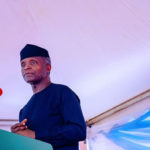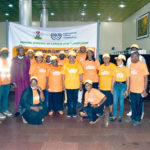HOW long does it take to clear a cargo at a named Nigerian port or border? The simple answer is that no one knows, and if we did, you would not be reading this. Time and again, corporate entities and private individuals who have had occasion to conduct business at the ports have lamented the extreme difficulty of getting their cargoes through Customs, never mind within a reasonable period of time.
Just last month, Mr. Stephen Amaechi, Managing Director, FEDAN Investment Limited, speaking at this year’s Lagos International Trade Fair, lamented the obstacles faced by private sector operators in clearing their goods from the country’s ports. Mr. Amaechi did not mince words, laying the blame for the current untoward situation squarely at the doorstep of the Hameed Ibrahim Ali-led Nigeria Customs Service (NCS). Amaechi’s lamentation highlighted three key concerns: (i) the unreliability of the dispute resolution system between the Nigerian business community and Customs; (ii) “long and laborious documentation processes and too many agencies of government involved in cargo clearing;” and (iii) “interception of containers [already] duly cleared by the Nigeria Customs Service at the ports.”
Interestingly, a month before Mr. Amaechi poured out his frustration at the Lagos international Trade Fair, the Lagos Chamber of Commerce and Industry (LCCI) had expressed similar concerns, accusing the NCS of abandoning its statutory role of trade facilitation for the pursuit of lucre. The statement signed by the LCCI’s Director-General, Dr. Muda Yusuf, is worth quoting at some length: “The situation calls for urgent intervention and reforms (sic) of the Nigeria Customs Service. There are issues of undue delays, weak application of technology, arbitrariness in valuation, impunity, the uncertainty of international trade transactions, cost escalation, negative investment climate perception, ineffective mode of seeking redress, pervasive human interface, among others.”
Furthermore, “the business community is compelled to interface with too many units of the Nigeria Customs Service and other government agencies, which makes doing business extremely difficult and frustrating. It also predisposes the system to brazen extortionist practices.” In the past week, other stakeholders and users of services at the ports, including freight forwarders, have echoed the above concerns, adding to the litany of woes incessant multiple checks by different units of the Customs, and multiple checkpoints on exits from the ports and borders that more or less constitute ambushes on ordinary citizens conducting legitimate business.
Not only do we identify with these stakeholders in their denunciation of the malpractices of the operatives of the NCS and the Nigeria Police Force (NPF) and their calls for immediate reform; like the majority of Nigerians, we are astonished at the mismatch between the rhetoric of these state agencies and the reality on the ground. We are also worried that, ultimately, these agencies, through their persistent interference in the smooth running of business at the ports and borders, contribute to the country’s negative investment climate perception. As we have noted before, one effect of this scenario is that businesses determined to avoid the arbitrary blockages at the country’s ports have started diverting their cargoes to similar facilities in neighbouring countries, thus depriving the exchequer of much-needed revenue. At the same time, businesses, quite naturally, pass on the higher cost of transporting such cargoes to hapless consumers, thus worsening their hardship.
What is going on within these agencies is no mystery, and those at the upper echelons know who the bad eggs are. The question is whether they are bold enough to flush them out. The next time we ask how long it takes to clear a cargo at a named Nigerian port or border, we hope we can give a precise and reliable answer.
YOU SHOULD NOT MISS THESE HEADLINES FROM NIGERIAN TRIBUNE
Lagos Is Second Least Liveable City In The World For 2021
Lagos is the second least liveable city in the world for the year 2021. This is according to the most recent annual ranking put together by the Economist Intelligence Unit (EIU)…
CLAIM 1: A Twitter user claims UNICEF said any efforts to block children from accessing pornography might infringe their human rights.
WATCH TOP VIDEOS FROM NIGERIAN TRIBUNE TV
- Relationship Hangout: Public vs Private Proposals – Which Truly Wins in Love?
- “No” Is a Complete Sentence: Why You Should Stop Feeling Guilty
- Relationship Hangout: Friendship Talk 2025 – How to Be a Good Friend & Big Questions on Friendship
- Police Overpower Armed Robbers in Ibadan After Fierce Struggle






